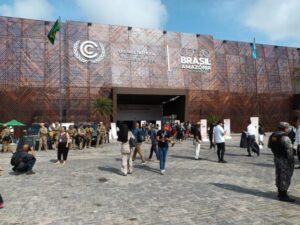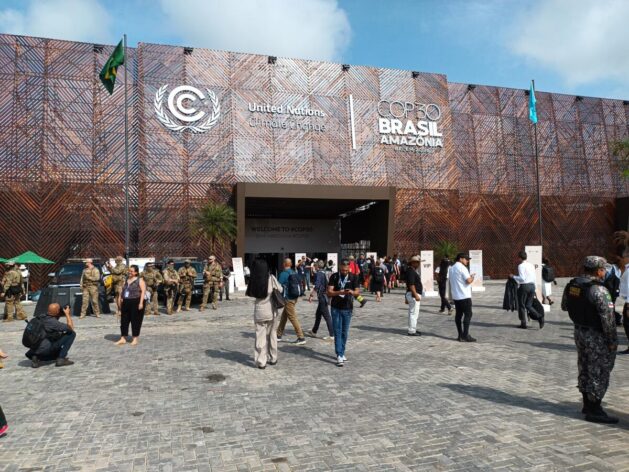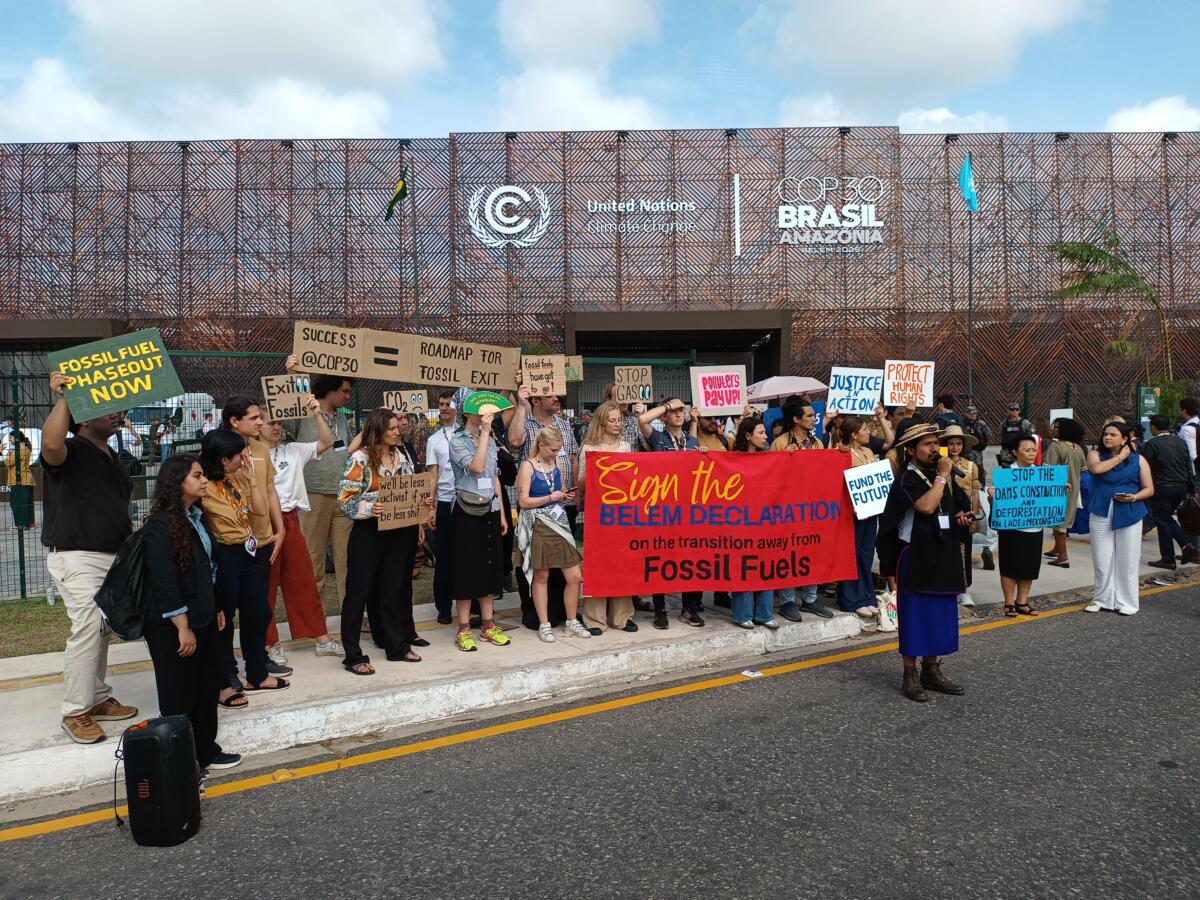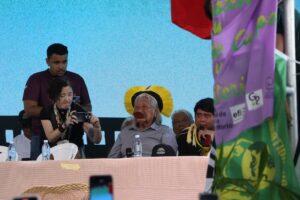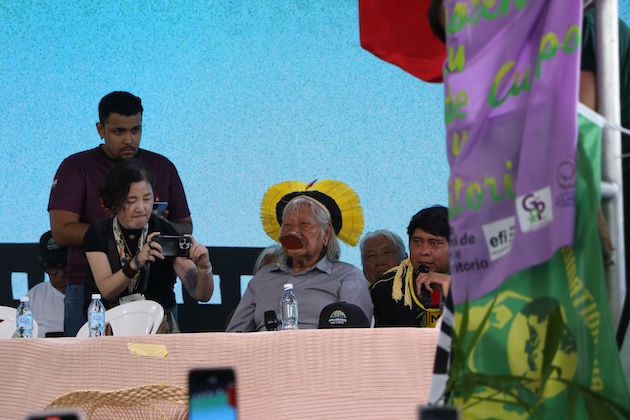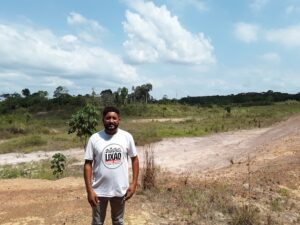
Biodiversity, Climate Action, Climate Change, Climate Change Finance, Climate Change Justice, Conferences, Development & Aid, Editors’ Choice, Featured, Global, Headlines, Human Rights, Latin America & the Caribbean, Sustainable Development Goals, TerraViva United Nations
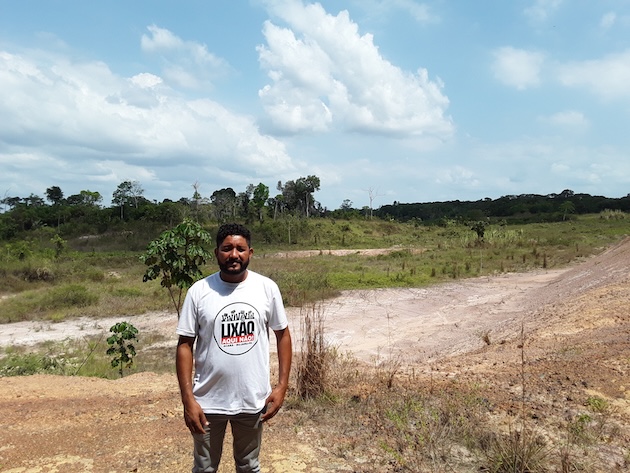
Fabio Nogueira, a leader of the Menino Jesus Quilombola Afro-descendant community, stands in front of a proposed landfill, which is 500m from their homes. Credit: Joyce Chimbi/IPS
– Just 30 minutes from where the UN climate negotiations are unfolding in the port city of Belém, Afro-descendant communities are engaged in a fierce struggle for the full recognition and legal titling of their ancestral territories—critical as their security and livelihoods are compromised by businesses wanting to set up contaminating landfill sites and drug cartels.
A boat ride along the expansive Amazon basin takes you inside the forest. It is the largest rainforest in the world, estimated to be 5.5 to 6.9 million square kilometers and spanning eight countries.
In the forest are the Quilombos or communities founded by descendants of Africans who escaped enslavement. They have defended their rights for generations. Across Latin America and the Caribbean, they may be known by different names, but they are all Afro-descendant communities with shared histories.
Well over 130 million people in Latin America identify as Afro-descendant, descendants of those forcibly brought to the Americas during the transatlantic slave trade. In Brazil, Ecuador, Colombia, and Suriname, these communities collectively hold recognized management rights to nearly 10 million hectares, or nearly 24 million acres, of land.
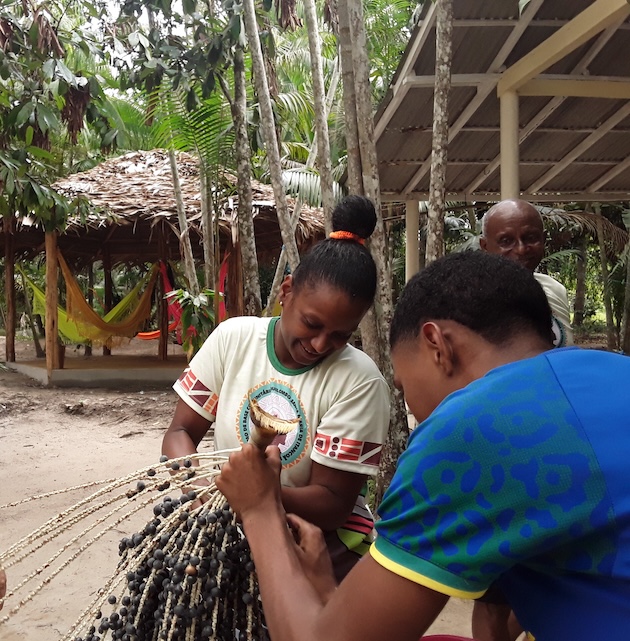
Açaí is harvested in an Afro-descendant community near Belém, Brazil, where COP30 is underway. Açaí is part of the daily diet and is historically known as a source of subsistence. Credit: Joyce Chimbi/IPS
But the Amazon is the backdrop for the struggle for the full recognition and legal titling of their ancestral territories, as guaranteed by the Brazilian Constitution of 1988.
IPS spoke to Fabio Nogueira, a leader among the Menino Jesus Quilombola community home to 28 families about their struggles and successes.
“Without titles, Quilombolas are exposed to invasion and displacement from big companies, ranchers, farmers and land grabbers.”
Alarmingly, criminal gangs target the Quilombola communities and their leaders for illegal activities.
Increased surveillance and drug seizures on direct routes from Latin America to Europe have turned the Amazon into a drug corridor. In Brazil, drug traffickers use ‘rios de cocaine,’ or cocaine rivers, jeopardizing the safety of the Quilombos along the Amazon rainforest.
Major rivers and remote areas in many Quilombola territories serve as key “cocaine corridors” for drug trafficking. The lack of state presence and land titling makes these communities soft targets.
Today, the Amazon rainforest is also the scene of a fierce struggle against landfills or sites for the disposal of waste material. He says landfills in the Amazon cause significant problems, including contaminating the soil and water with heavy metals and other toxins and releasing greenhouse gases like methane.
“We are currently 15 kilometers away from the lixão de Marituba landfill and it still pollutes our air and environment. Now they want to bring a landfill only 500 meters from our community. The landfill will be 200 hectares in size. We are saying no to landfills and have a case in court,” Nogueira said.
“The Menino Jesus quilombola community is in a legal dispute. We are resisting the proposed landfill project.”

Belém is a port city and gateway to Brazil’s lower Amazon region. A 30-minute boat ride through the expansive Amazon River takes you inside the forest. Credit: Joyce Chimbi/IPS
The project was planned without recognition of their existence or the impact it would have on them. The Public Defender’s Office of Pará has filed legal action and recommended the project’s suspension, citing that the land is public and part of the area traditionally occupied and claimed by the community for twenty years.
If the Brazilian State maintains the current pace of land regularization of quilombola territories, it will take 2,188 years to fully title the 1,802 processes currently open at the National Institute for Colonization and Agrarian Reform.
The slow pace of titling negatively affects forest preservation. Despite two studies indicating that the Quilombola play a crucial role in climate solutions, their ongoing struggle for basic recognition makes it difficult for them to secure their rights or access climate finance in formal spaces, such as COP30, according to Malungu, the coordinator of Associations of Remaining Quilombo Communities of Pará, which represents and advocates for the Quilombola communities in the state.
Two recent studies indicate that titling is a determining factor for the success of Quilombos in protecting the Amazon and titled territories maintain 91 percent of their forests, while non-titled territories preserve 76 percent.
“Alarmingly, self-declared territories that do not yet have certification (necessary for starting the titling process) had a rate of forest loss 400 percent higher than that of titled territories, highlighting the urgency of recognition to halt degradation.”
During COP30, a visit to the two Quilombos—Menino Jesus and Itaco-Miri—in the Amazon rainforest demonstrates the significance of communal land titling. It illustrates how this titling enhances the well-being of Afro-descendant peoples across the Amazon and how secure land tenure contributes to climate goals through carbon absorption, forest protection, and biodiversity preservation through traditional agriculture.
Throughout six generations, Quilombola communities stand out as caretakers and conservers of the Amazon rainforest’s biodiversity, using sustainable practices passed down through generations.
Menino Jesus and Itacoã-Miri territories and other Afro-descendant community lands ‘have high biodiversity and irrecoverable carbon and were associated with a 29 to 55 percent reduction in forest loss compared to control sites.’
Still, communities deliver better results with tenure security. Key data from Instituto Social Ambiental’s Study on Quilombo Territories in the Brazilian Amazon shows that while Quilombos face significant land tenure challenges, approximately 47 percent of mapped Quilombos lack even basic delimitation or fixing of boundaries, and over 49 percent of communities have not even passed the first step.

Along the Amazon basin, communities often live in houses facing the river. The forest is their backyard. Credit: Joyce Chimbi/IPS
Meanwhile, they remain outstanding in their conservation performance. They have preserved nearly 92 percent of mapped Quilombo territories, including forests and native vegetation. From 1985 to 2022, these territories lost only 4.7 percent of original forest cover, compared to 17 percent loss in private areas.
But political recognition has moved much more slowly than scientific recognition. Shortly before COP30, President Luiz Inácio Lula da Silva visited the Afro-descendant communities of Menino Jesus and Itacoã-Miri near Belém, Pará, as part of an agenda of preparatory meetings for the COP30 climate conference.
It has taken 30 COPs for a historic breakthrough, as COP30 has included the term ‘people of African descent’ in draft negotiating texts of the UN climate convention for the first time. This inclusion is a significant step toward formally recognizing this population in global climate policy.
The term ‘people of African descent’ has been incorporated into draft documents, including those related to the Just Transition and the Gender Action Plan. This had never happened in the history of the UN climate convention system, which has often been more technical and less focused on human rights and racial justice.
The Belém Declaration on Fighting Environmental Racism is a political commitment that was joined by 19 countries at the leaders’ summit before COP30 began. The text acknowledges the disproportionate exposure of people of African descent, Indigenous Peoples, and local communities to environmental harms and climate risks.
This declaration is an international agreement that seeks to foster a global dialogue on the intersection of racial equality, climate change, and environmental justice. The declaration recognizes the global ecological and racial justice crises as intertwined and proposes cooperative actions to overcome historical inequalities affecting access to environmental resources.
Its goals include reinforcing human rights and social justice in environmental policy, broadening the scope of equality in sustainable development, and building a more equitable future for all.
Coelho Teles from the Quilombo community told IPS that he is not aware of this recognition because they have “been sidelined. We do not know how to get involved and participate in COP30.”
Brazil identified forests and oceans as twin priorities and launched the Brazil-led Tropical Forests Forever Facility at COP30, seeking to compensate countries for preserving tropical forests, with 20 percent of funds reserved for Indigenous Peoples.
Science has shown communities keep forests standing. For the Tropical Forests Forever Facility to achieve desired results, those in Quilombo territories say their recognition and participation will need to be significantly more substantial.
IPS UN Bureau Report

